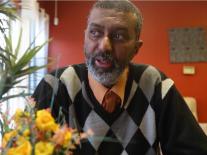Looking for answers – Calgary’s Somali-Canadian community speaks out

“I didn’t know their names. But I knew their faces — I knew these young men.”
As Abdirahim Addow talks about Calgary’s first two homicide victims of 2015, he is clearly a man in pain, a palpable grief he shares with many of his fellow Somali-Canadians who call the city home.
It’s not hard to understand why the killings of Abdullahi Ahmed, 26, and Murat Osman Omar, 23, would send shock waves through his or any other tight-knit community. For the estimated 5,000 Calgarians either from the beleaguered East African country or with Somali ancestry, they have left a homeland plagued by flood, famine and prolonged internecine conflict for a new life in a safe, secure and democratic society.
Addow, though, sees up close those trials and tribulations, joys and sorrows every day. His business, Waryaa Restaurant and Samosa House, is one of its central gathering places. “When it comes to business, I am a risk taker,” says the 49-year-old, university educated Calgarian in a soft voice. “If you work hard, there are many opportunities here.”
On a recent day, a small stretch of shops and businesses catering to the Somali-Canadian community in the city’s Forest Lawn district is humming with a steady stream of customers. The busy entrepreneurs inside, though, are carrying a heavy weight — not just for the tragedies that kicked off 2015, but also for the secondary effects on them and their clientele.
“Some of our people are not happy,” acknowledges Mudhir Mohamed, 59, an esteemed community leader who is also the proprietor of Jubba Nile grocery store, a place jammed with everything from women’s fashions and high-end china tea sets to grocery staples and a Halal butcher shop. “More than 95 per cent of Somali people here work hard. We are Canadians too. Everyone in this city is an immigrant.”
As a relatively new immigrant population to our city and province, Canadians from the Somali diaspora have joined a greater society that has often gleaned its only knowledge of them from popular culture. Films like 2013’s Captain Phillips, based on a true story about the hijacking of an American ship by Somali pirates, and Albertan Amanda Lindhout’s memoir about her abduction by young Somali thugs, A House in the Sky, depict the desperation and violence of the country.
Unfortunately, these stories combined with news articles about violence and religious extremism among a small fraction of its people is about all that is publicized about the Somali-Canadian community, the vast majority who are devoting their daily efforts to integrating their culture of origin with their new Canadian identities.
For people like Mohamed, much of his own frustration lies in the misconception that the recent spate of violence is the smaller community’s problem, rather than all society. “We’re concerned about the security of all Calgarians,” says the father of six. “We want to know how to keep our young people safe — it’s not specific to Somalis.”
People like Deka Adan, who runs Dubai Fashion with her husband Abdi Dirie, share that concern. “We put our kids in private school, it’s too risky in a public school,” she says.
Adan, who wanted to become a nurse when she arrived as a teenager in Canada in 1990, says her hopes and dreams, along with parenting strategies, aren’t any different from parents in any other quadrant of the city. “We try to be role models for our kids, friends to them,” she says. “We don’t drink, smoke or do drugs and we show our children that hard work pays off.”
New immigrants from Somalia — or any other foreign country, for that matter — balance these concerns with other challenges, culture shock remaining high up on the list. “Some arrive not knowing the language, the weather’s too cold for them,” she says. “It’s hard for some to stay on top of things.”
She feels that when youth in her community get into trouble, they often aren’t given the same treatment as others in the same boat. “A kid gets caught shoplifting, is now a criminal — they drop out of school, can’t get a job. They get disappointed — they start to deal drugs.”
Still, she says her community needs to take responsibility for their failings. “We are together to face the problem. I have hope for the next generation.”
Mohamed hopes that when the larger community thinks of its neighbours who hail from far flung places like Somalia, their thoughts include the successes so many are having, not just the bad news stories.
“We have young people becoming professionals, professors and businesspeople doing well,” he says. “We need to believe in ourselves, be proud of ourselves.”
That is something Abdirahim Addow also hopes he can communicate as one of his community’s most citizens. “For the past nine years, I have run my business here, living across the street,” says Addow, who would like to see a stronger community association located within walking distance of his fellow Somali-Canadians’ homes.
“I have had no problems,” he says, adding with a smile: “This is a good community, a place of opportunity.”
source:Valerie Fortney